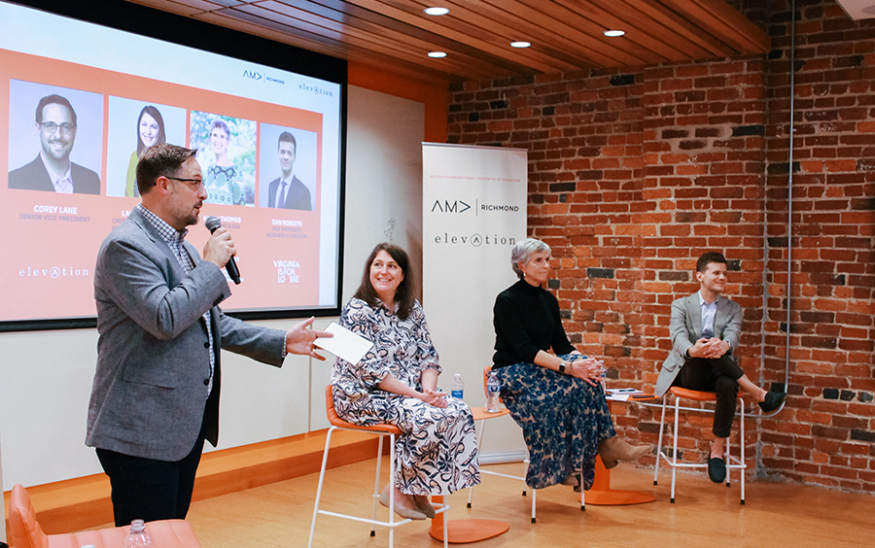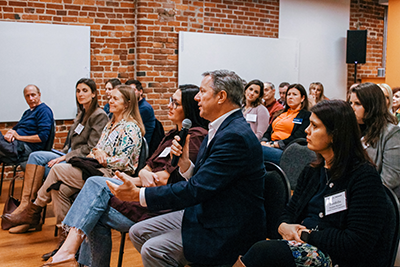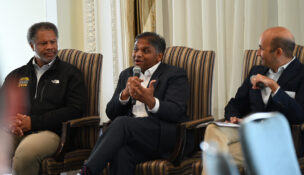How We’ll Eat, Shop + Travel in 2026
Navigating Uncertainty with an Empathetic Outlook

Photo-Credit---Kim-Peters,-Elevation_AMA_Panel_-32

Photo-Credit---Kim-Peters,-Elevation_AMA_Panel_-32
How We’ll Eat, Shop + Travel in 2026
Navigating Uncertainty with an Empathetic Outlook
Last month, Elevation and AMA Richmond brought together marketers and business leaders for a look at the year ahead and how to plan effectively.
How We’ll Eat, Shop + Travel in 2026 explored the forces reshaping three of the most universal consumer sectors.
Setting the Stage
Elevation Senior Vice President Corey Lane opened the session by naming what’s on every marketer’s mind: uncertainty. “This year has just felt different,” he began, noting that marketers’ established long-term goals are being reevaluated against shifting economic realities, automation, and social change. “With things changing by the day—from supply chain disruptions and tariffs to consumer behavior—the best we can do is be proactive about how we’ll react.”
Elevation was inspired to explore the sectors shaping consumer quality of life to support clients who have expressed frustration about the challenge of long- and near-term planning. “Even if you don’t work in grocery, retail, or tourism,” Lane noted, “what happens in these industries will affect your customers, your colleagues, and your household.”
To unpack the outlooks in these sectors, the panel featured three Virginia-based national experts:
- Laura Strange, Chief Communications & Engagement Officer at the National Grocers Association (NGA)
- Nancy Thomas, President & CEO of InUnison, representing the Virginia Retail Federation and the National Retail Federation
- Dan Roberts, Vice President of Research & Strategy at Virginia Tourism Corporation
Eating in 2026: Health, Personalization, and the Local Advantage
The NGA’s Laura Strange opened the discussion with a look inside the grocery aisles, describing how independent grocers nationwide are navigating rising costs and changing expectations. “Margins remain tight, but customers are returning to stores more often,” Strange explained, citing NGA data showing grocery trips per household rising by over 10%. That trend, she said, speaks to renewed appreciation for local stores and the personalized service they offer.
Today’s consumers are driven by value, convenience, and community connection. Independent grocers are standing out by delivering seamless, omnichannel experiences, functionally-focused products, and satisfying the growing appetite for culinary fusions and global flavors.
Strange noted that as inflation, tariffs, and labor costs pressure the industry, retailers are investing in technology and loyalty programs that put personalization first.
Shopping in 2026: Emotional Economies and the Pursuit of Value
Nancy Thomas of InUnison discussed how evolving consumer sentiment is reshaping Main Street. Her message: retail is resilient, but it’s being redefined.
Drawing from new data from the National Retail Federation, Thomas described a paradoxical consumer mood: cautious but still spending. “People are more deliberate now,” she said. “They’re shopping for meaning as much as merchandise.” That shift is forcing retailers to rethink what “value” means. For some, it’s price and convenience. For others, it’s sustainability, experience, or community impact. “2026 will be defined by both value and by values,” Thomas emphasized, echoing a broader theme of the panel, “People want to support local, authentic companies with values that align to their own.”
Thomas also shared breaking reporting from NRF’s Holiday Retail Forecast, projecting a 3.7% to 4.2% YOY increase in national core retail sales, equating to $1.02T in consumer spending. Thomas pointed to a narrowing gap between online and brick-and-mortar sales as one factor driving this projection.
 Tourism in 2026: Cutting Through the F.O.G.
Tourism in 2026: Cutting Through the F.O.G.
Finally, Dan Roberts of Virginia Tourism Corporation unpacked what’s ahead for travel, and what it means for the state’s $36B tourism industry.
His central metaphor was that the travel market in 2025 is in a “F.O.G.: Fragmented and Flipped, On-Edge, and Guarded but Growing.” Despite economic uncertainty, travel remains an emotional priority.
“The economy is steady but fragile,” Roberts said, noting that consumer spending continues to rise modestly even as job growth cools. High-end travelers are driving industry growth, and Virginia’s hotel sector is outperforming national averages, fueled by demand rather than pricing. Roberts also pointed to a steady increase in rail travel, benefiting destinations like Richmond, which value-seeking travelers can access easily from Northeast markets like Philadelphia, D.C., Baltimore, and Boston.
Roberts’ advice mirrored the session’s broader takeaway: “Stay agile. Focus on proximity and value. The future belongs to those who can adapt quickly.”
A Common Thread
Across grocery aisles, retail storefronts, and travel corridors, one theme kept recurring: value-seeking consumers. Every panelist agreed that these customers are shaping the future, defining value as much by quality, purpose, connectivity, and experience as by price. The economy may be steadying on paper, but for many people, life still feels hectic and uncertain. The brands winning in this environment are those that seek to deeply understand their customers and show up for them in meaningful ways.
That means personalization, customer service, and relationships matter as much as deals and discounts. Empathy must become a core strategy, grounded in curiosity about how and why people’s needs and priorities are constantly evolving. The main takeaway was clear: plan with humility, stay flexible, and remain connected to the needs of the people you serve.
Headquartered in Richmond, Virginia, Elevation is an integrated advertising agency dedicated to elevating brands through creative and strategic excellence. Since 2001, Elevation has delivered a higher level of thinking and a higher level of service, helping regional and national marketers achieve a higher level of success.



 Tourism in 2026: Cutting Through the F.O.G.
Tourism in 2026: Cutting Through the F.O.G.















